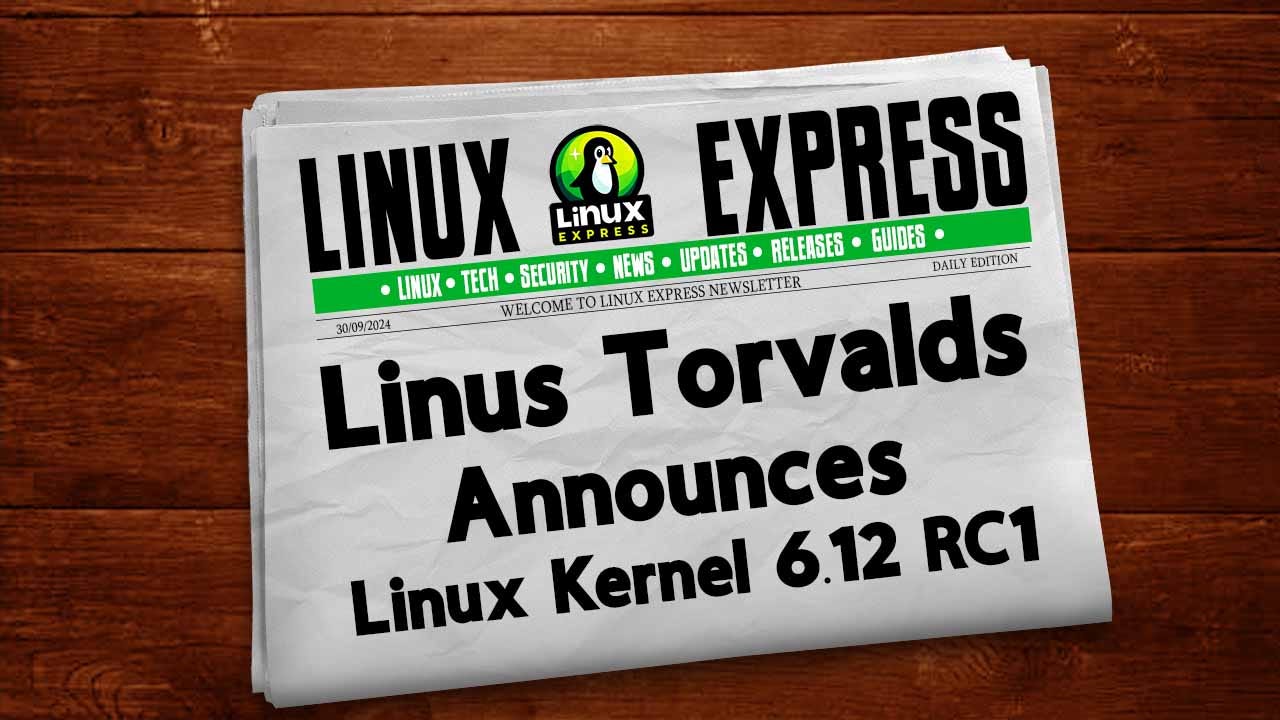Linus Torvalds Announces Linux Kernel 6.12 RC1
On September 29, 2024, Linus Torvalds announced the first RC1 of Linux Kernel 6.12 with real-time PREEMPT_RT and sched_ext.
On September 29, 2024, Linus Torvalds announced the first Release Candidate (RC1) for Linux Kernel 6.12, marking the next public testing phase for one of the most exciting recent Linux kernel releases. This release follows two weeks of active development, introducing several groundbreaking features to improve performance, real-time capabilities, and hardware compatibility. Torvalds emphasized the significance of this version, especially with long-anticipated features like PREEMPT_RT now mainlined, alongside a host of updates for drivers, networking, and scheduling.
This article has everything you need to know about Linux Kernel 6.12 RC1, from key features and hardware support to network enhancements and the expected release timeline.
Key Features of Linux Kernel 6.12
Here is the list of all the features which will be available in the next Linux Kernel update:
Real-time PREEMPT_RT Support
One of the most significant features in this release is the mainlining of PREEMPT_RT. This long-awaited real-time patch dramatically improves Linux's ability to handle time-sensitive applications by reducing latency. It is ideal for industries that rely on precise timing, such as aerospace, automotive, and industrial automation. This feature is available under the "EXPERT" configuration option, offering more flexibility for users who require real-time processing.
sched_ext Scheduler
The sched_ext scheduler is a major update introducing extensibility in task scheduling. This new scheduler enhances workload management, allowing more efficient distribution of resources. By enabling sched_ext, the Linux kernel can better balance tasks, which is especially beneficial for systems handling varied and demanding workloads.
Clang Support and LTO
Linux 6.12 introduces Clang compatibility with Link Time Optimization (LTO) for nolibc. This development optimizes the compilation process, resulting in faster builds and better overall performance, making it a more flexible option for developers who use Clang as their compiler.
NVIDIA Virtual Command Queue
This release also supports NVIDIA's virtual command queue for SMMUv3, which enhances graphics performance, particularly in virtualized environments. With NVIDIA hardware widely used in AI and machine learning, this feature positions Linux to support high-performance graphics and data-heavy workloads better.
cpuidle Tool Enhancements
The cpuidle tool has been updated to provide more detailed information on the residency of idle states, offering users a clearer view of system power consumption. It is particularly useful for optimizing energy usage in power-sensitive applications like data centers.
Enhanced Hardware and Driver Support
Linux Kernel 6.12 brings a range of new drivers and hardware updates:
Intel Xe2 Graphics for Lunar Lake and Battlemage processors is now enabled by default, providing out-of-the-box support for Intel's latest GPUs.
Improved USB Audio Driver performance, specifically in PCM buffer allocation handling, leads to more stable audio experiences across applications.
Support for Realtek automotive PCIe devices, LC824206XA micro USB switches, and Intel ArrowLake-U chips expands hardware compatibility, ensuring the kernel remains versatile across platforms.
Networking Enhancements
Linux 6.12 introduces several critical networking improvements:
Device Memory TCP Support: This feature allows zero-copy reception of TCP payloads to DMA buffers, reducing memory overhead and improving network efficiency, particularly for high-performance computing environments.
IPv6 IOAM6 Support: Enhancements in IPv6 include support for tunsrc encapsulation mode and better handling of the Prefix Information Option (PIO). These improvements make IPv6 more efficient and robust for next-generation internet technologies.
Filesystem and Rust Language Updates
In addition to hardware and networking, Linux 6.12 continues improving its filesystems with EXT4, Btrfs, Bcachefs, and F2FS updates. Further Rust integration ensures Linux remains at the cutting edge of safe, fast system-level programming, allowing developers to utilize Rust's memory safety guarantees within kernel development.
Expected Release Timeline of Linux Kernel 6.12
The final release of Linux 6.12 is expected between mid to late November 2024. Torvalds hinted that the stable release would likely follow seven or eight Release Candidates (RCs), with the final version landing by November 24 at the latest, assuming no major issues arise during testing.
Conclusion:
Linux Kernel 6.12 is shaping into a landmark release with its PREEMPT_RT real-time capabilities, enhanced task scheduling, and expanded hardware support. These advancements solidify Linux's position as a leading operating system for performance-critical applications. With a focus on optimizing both software and hardware integration, this release has the potential to transform industries that rely on real-time performance and efficient resource management.
The code is available for public testing if you're eager to try out the Linux Kernel 6.12 RC1. Remember, though, that since it's an early-release candidate, it's recommended only for testing environments, not production systems.
Frequently Asked Questions (FAQs)
Q.1 What are the key features of the new Linux kernel 6.12?
A.1 Key features include PREEMPT_RT for real-time support, the sched_ext scheduler for better task management, Clang LTO integration, and NVIDIA Virtual Command Queue support.
Q.2 How does the new sched_ext scheduler improve performance?
A.2 sched_ext allows more efficient task distribution, balancing workloads across system resources, which improves performance in multi-threaded and high-demand environments.
Q.3 What is the significance of real-time "PREEMPT_RT" support going mainline?
A.3 Including PREEMPT_RT into the mainline kernel enables Linux to handle time-sensitive tasks, making it suitable for real-time applications like industrial automation and robotics.
Q.4 How does the new thermal core testing module work?
A.4 The thermal core testing module allows developers to create mock thermal zones using debugfs, enabling them to simulate and test thermal management features in different conditions.
Q.5 What are the networking enhancements in Linux kernel 6.12?
A.5 The most notable enhancements include Device Memory TCP support, which reduces memory overhead, and IPv6 IOAM6 improvements, which enhance packet handling and encapsulation in IPv6 networks.





